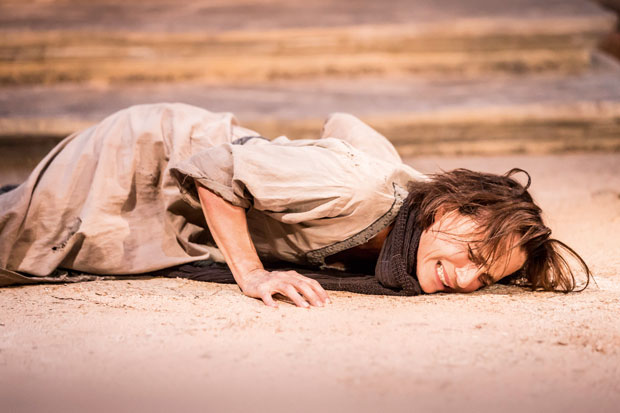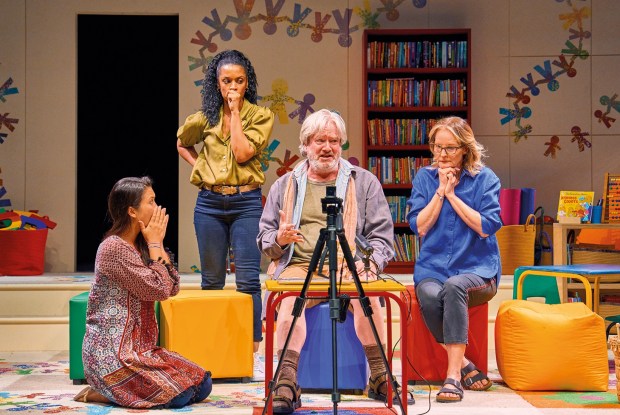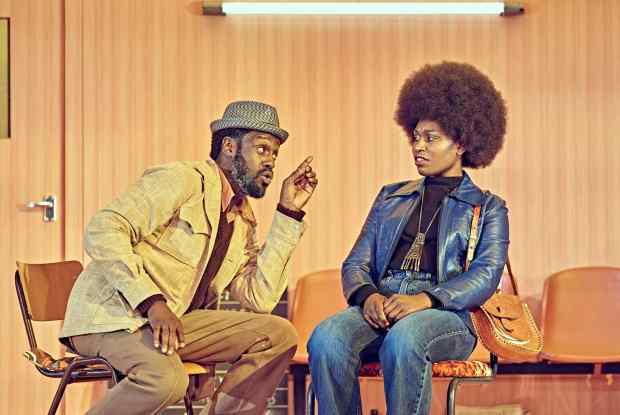First, a bit of background. Conquering Agamemnon slew his daughter, Iphigenia, in return for a fair wind to Troy. This rather miffed his wife, Clytemnestra, who bashed his head in with an axe when he came swaggering home. Her retribution laid a religious duty on their son, Orestes, to avenge his dad by slaying his mum, which, in its turn, put a bit of a crimp in his social calendar.
Sophocles’ play opens during a lull in the butchery. Orestes, now in exile, throws Clytemnestra off her guard by releasing details of his death. The details consist of an urn containing his ashes delivered to the palace. The arrival of the deceitful vessel prompts a fit of agonised hysterics in his sister, Electra, who loathes her mother, for obvious reasons, and who has spent years pining and weeping on the palace doorstep, praying that Orestes will show up, heavily armed and in a bad mood. When he arrives, blades are drawn.
The exposition in Frank McGuinness’s version feels clumsy because Sophocles’ audience knew the tale backwards and needed no primer. And the action drags, I’m afraid, because we westerners have been reared on TV scripts, aimed at fidgety channel-hoppers, that are so carefully written and edited that not a syllable, not a beat, is wasted. About half of this play, the second half, is genuinely gripping. (You can tell because the coughing stops.) Kristin Scott Thomas, ethereally majestic as always, plays Electra with a studied informality that she supplements with zinging passages of rage and bitterness. Not all her choices are persuasive. When she fails to recognise Orestes, for reasons that are unclear, she squinnies uncertainly in his direction and then sniffs him all over like a police Labrador checking out a drug mule.
The set and costumes, as always with Greek plays, are bonkers. The palace gate is a crested double door surrounded by wedges of chipped concrete. The rulers of a Mediterranean superpower, at the zenith of its might, would have hired a couple of cowboy builders to fix the plasterwork. The costumes in this production are a complete mystery. My guess is that the cast were packed off to Oxfam with a tenner each and instructions to ‘choose something witty’. Scott Thomas got a skimpy mushroom-coloured jerkin, belted at the waist, which suggests no particular historical period. Wise pick. Peter Wight (Servant) bought himself a complete Trotsky outfit and wasn’t told to take it back. Tyrone Huggins (Aegisthus) decided that black bovver boots and Great War puttees would accurately convey the Homeric atmosphere. Diana Quick (Clytemnestra) didn’t go to Oxfam. She went to Camden Market and got a lovely full-length robe from the 1970s, and some ribbony things to put in her hair.
Despite these odd gestures this is a perfectly accessible account of a lesser Greek tragedy. Lesser because Electra’s role is secondary to the wider narrative. The tragic predicament of Orestes, which this play overlooks, is the main story here.
The melodrama Next Fall was a triumph in New York, co-funded by Elton John. Luke and Adam are a happily bickering gay couple whose affair is ruined by a car smash. Luke lies in a coma. Friends and family gather. Their romance is told in flashback. The big thing about Luke is that his parents think he’s straight.
When his Dad announces a surprise visit to the New York love nest, the boys panic. ‘We gotta de-gay the apartment.’ Out go the nude studies, the gaudy tableware, the Truman Capote books and the framed shots of themselves slobbering mouth-to-mouth in front of national landmarks. But Dad shows up early. Adam is still there. A scene crammed with tension and hilarity seems to beckon but the writer fluffs it by getting Luke to call Adam ‘babe’ in front of his dad. That’s silly. Even sillier is that Dad suspects nothing. Nor does Mom, come to that. How dim are they? Luke has no girlfriend. His closest pal sells aromatic candles for a living. And he quit the sticks for Manhattan. And he’s straight? This level of naivety would be believable in Victorians, or Martians, but Luke’s parents are sassy, worldly characters raised in the 1960s. Dad once worked for a conspicuously gay property magnate. Mom is a recovering wild-child who served six months for pushing dope to undercover narks. And they can’t work out why their son always wants moisturiser for Christmas?
This central absurdity, added to the play’s flimsy emotional texture, make it more a dud than a peach. Mind you, the theatre was full. And the appreciative audience was dominated by tanned and immaculately groomed men who probably have friends in the candle trade.
Got something to add? Join the discussion and comment below.
Get 10 issues for just $10
Subscribe to The Spectator Australia today for the next 10 magazine issues, plus full online access, for just $10.
You might disagree with half of it, but you’ll enjoy reading all of it. Try your first month for free, then just $2 a week for the remainder of your first year.














Comments
Don't miss out
Join the conversation with other Spectator Australia readers. Subscribe to leave a comment.
SUBSCRIBEAlready a subscriber? Log in